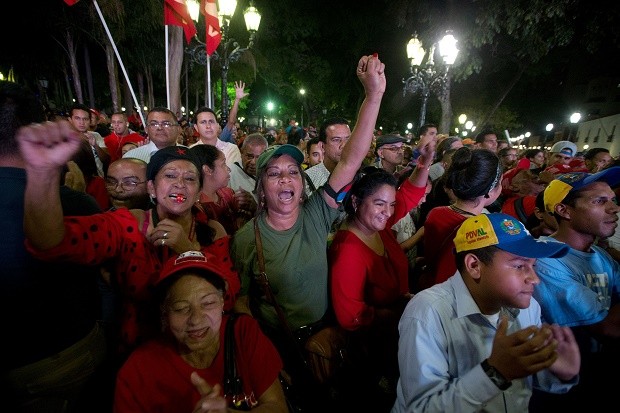Venezuela president gets rare live TV criticism

Government supporters look at Venezuela’s President Nicolas Maduro during his the annual state of the nation report, on a television screen outside of the National Assembly in Caracas, Venezuela, Friday, Jan. 15, 2016. Ahead of a surprise dire economic data release, Maduro said he would declare an economic emergency giving him 60 days to unilaterally enact sweeping reforms. The decree will be debated in the newly-seated opposition congress next week. AP
CARACAS, Venezuela — In a stunning display of Venezuela’s tense new political order, President Nicolas Maduro suffered through a long scolding from the head of the country’s new opposition Congress Friday after presenting his state of the nation address.
Congress leader Henry Ramos wagged his finger inches from the embattled president’s head in a rebuttal that was broadcast live across the South American country — unprecedented media access for an opponent of the country’s socialist revolution.
It had already been a night of firsts. Neither Maduro nor his predecessor the late President Hugo Chavez ever had to contend with a hostile audience for their state of the nation speeches. Critics of the administration took control of the institution last week for the first time in 17 years.
Maduro himself had mostly bad news to share.
Hours earlier, the Central Bank released key economic data for the first time in more than a year, showing an economy in shambles and for the first time acknowledging what analysts have long said: That annualized inflation has surged into triple digits.
Article continues after this advertisementMaduro described the numbers as “catastrophic” and devoted most of his three-hour speech to what he called a “monstrous attack” on the economy by business owners and other foes of the leftist government.
Article continues after this advertisementREAD: Venezuela’s Maduro admits economic ‘catastrophe’
In his rebuttal, Ramos took a professorial tone as he laid out the opposition’s view that Maduro himself is responsible for the crisis.
“If you don’t want to hear this, close your ears or leave,” he warned as Maduro sipped from a coffee cup and checked his watch in the next chair.
“If you give in to the desire to have more and more bolivars with the same number of dollars, your bolivars are going to lose value,” Ramos said, referring to the country’s plummeting currency.
The sight of an opposition leader lecturing the president on a live television feed all networks were required to carry shocked even ardent supporters of the sharp-tonged new congressional leader. Maduro rarely exposes himself to questions from independent reporters, much less questioning from political opponents. And few broadcast networks carry opposition events.
Maduro had taken an unusually conciliatory tone in his address, calling for dialogue even as he warned the opposition that it could easily get overconfident and lose the next election. He also vowed to block one of its key initial projects: Giving people who live in government housing the title to their homes.
“No, no and no, we will not permit it,” Maduro said during one of the most dramatic moments of his speech. “You’ll have to get rid of me first.”
The opposition has pledged to do just that, issuing a six-month deadline to hold a recall election.
Maduro mentioned in passing that his newly appointed Vice President Aristobulo Isturiz had spoken this week with U.S. Vice President Joe Biden and a high-ranking U.S. diplomat.
Ahead of his speech, Maduro declared an economic emergency giving him 60 days to unilaterally enact sweeping reforms. He later hand-delivered the decree to the head of Congress to be debated next week, but it’s not clear that the government will wait for approval to enforce it.
Venezuela, which has the world’s largest oil reserves, has suffered enormously as the price of oil has crashed from above $90 a barrel two years ago to just $24 today. Analysts say that means Venezuela is dangerously close to just breaking even on the oil it produces, which accounts for 95 percent of export earnings.
The country’s economy contracted by 7.1 percent during the quarter that ended in September 2015, and inflation reached 141.5 percent, according to the new Central Bank data.
Maduro echoed many Venezuelans’ fears Friday when he said he hoped the coming year would see peace, “not senseless violence that could lead anywhere.”